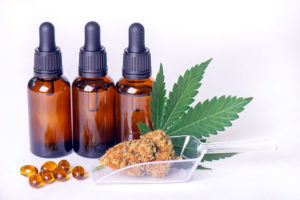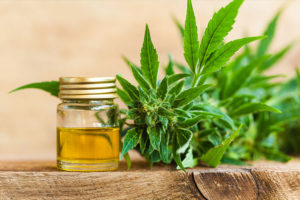The CBD industry is booming. The current global market is $3.09 billion, and experts project it to practically double by 2026. The projected growth of 125.58 percent makes it one of the fastest-growing markets in the world.
Part of this growth comes from widespread legalization. As of January 2020, the recreational use of cannabis is permissible in Canada, Georgia, South Africa, Australia, Uruguay, and 11 US states. And there are an additional two dozen or so countries that allow for medical use of cannabis.
While CBD can come from the same plant as marijuana, it has even broader legality. In the United States, CBD is legal in all 50 states as long as it comes from hemp. The government classifies hemp as any plant from the cannabis family with less than 0.3 percent THC.
The burgeoning industry, and its potential for astronomical growth, have made CBD the modern equivalent of a gold rush. Thanks to digital and social platforms, people can operate a CBD business without ever leaving home. Here are the things prospective business owners need to know to make money selling CBD oil online.
Create a Business Plan
A CBD oil business plan is the blueprint for the structure, purpose, and goals of a business. The first step in creating one is to perform copious amounts of research into the CBD market and all potential competitors. This qualitative and quantitative analysis will reveal several opportunities and hurdles.
For instance, online CBD businesses need to look at current legislation and buying trends. Additionally, they should consider the economic environment and potential barriers to entering the market, such as licensing fees. A market analysis should enable business owners to become unofficial experts on the CBD industry.
Part of the research process is determining what competitors are doing. This information allows new businesses to differentiate themselves and promote products and services that offer solutions or improvements. Some specific points to research are the competitor’s brand voice, inventory, delivery options, reputation, revenue, target audience, and social media presence.
After scouting out the CBD industry, prospective owners can begin piecing together their business plan. While we could dedicate an entire article on the subject, there are a few key components each plan should have. That includes:
- Executive summary: The introduction serves as a company overview, including purpose, mission, and vision statements. This section should be the last thing people write.
- Company description: A mile-high view of the company that covers its structure, history, inventory, and business goals.
- Market analysis: The manifestation of the research. The market analysis should include target demographics and evaluations of competitors’ strengths and weaknesses.
- Organization and management structure: This step includes internal and external members, as well as the structure of the business. For instance, internal members include owners, their percentage of ownership, their role, and background. External ones include advisors, accountants, and lawyers.
- Service or product: An in-depth review of the CBD products and services available from the inventory.
- Marketing and sales: Business owners should focus on how they will reach their target demographic through social and digital media, as well as SEO. This section may also include best practices for the sales team.
- Funding request: Many companies need an initial investment from friends, family, banks, credit unions, or other investors before opening. If they already have the funds, this part will include a repayment plan.
- Financial projections: Data on current sales and future ones.
- Appendix: Put any additional documents here, such as tax returns, logos, press clippings, patents, legal documents, and contact information.
Getting a License
Any company that wants to sell CBD needs a business license, permits, and registration. These requirements should be in the business plan to legitimatize the company. Some of the typical stipulations include:
- Business Formation: Owners can incorporate their business or form an LLC. Small operations tend to select LLC, which prevents owners from being liable for company debts or liabilities. The business formation details will depend on the state, though fees are typically around $100.
- CBD License: The licensing organization will depend on the state of incorporation. For instance, in Nevada, the Department of Taxation oversees CBD licensing. For more information on licensing requirements, check out the United States Small Business Association(USSBA).
- DBA Filing: Sometimes, companies want to conduct business under another name. For instance, Dave’s CBD Products may wish to operate under Dave’s CBD Oils. In this case, the DBA authorizes the ability to do business with a name that is different than the one on business formation papers.
- General Business License: This permit lets a company sell goods in a specific city or region. It does not necessarily allow someone to sell cannabis-products, though.
- Sales Tax Permit: Online and offline retailers need these permits. They enable a business to collect sales tax.
- Tax ID Number: The IRS uses this number to identify a company for tax purposes. People may also recognize it as an employer identification number or EIN.
Remember, licenses and permits vary from state to state. There may also be different requirements for conducting business based on locality. When in doubt, contact the USSBA to ensure proper protocol.
Find a Supplier
The key to finding a reliable CBD supplier is trust. Business owners should develop a rapport with suppliers based on open communication and transparency. All CBD products are not equal, so it is essential to find a supplier that will deliver top-of-the-line products.
CBD business owners will want to have proof of the manufacturing facility. The goal is to understand the CBD production process seed-to-sale completely. Additionally, they should ensure the supplier has the proper regulatory licenses and certifications. Here are some of the largest CBD suppliers in the United States:
Folium Biosciences
The largest vertically integrated producer of hemp-derived CBD in the United States is also a manufacturer and distributor. Folium Biosciences has a 300,000 square-foot facility at its Colorado Springs, Colo. headquarters, and utilizes cutting-edge extraction techniques. It also holds licenses in food and cosmetics, plus Kosher and Halal certification.
Global Cannabinoids
Global Cannabinoids is unique in that it creates proprietary hemp strains that are high in CBD, as well as other cannabinoids like CBN and CBG. The company has farms in Oregon, Colorado, and North Carolina and provides purchasers seed-to-sale tracking. This vertically integrated company only sells its products wholesale to CBD businesses.
Hemp Meds
Hemp Meds is a CBD wholesaler with 750 cooperative farms in northern Europe. Hemp Meds was the first mainstream name in CBD oil distribution and retail in the United States. Today, it is also the first and only provider of CBD products in Mexico.
Hemp Depot
Colorado is a hotbed for CBD activity, and Hemp Depot is no exception. This Colorado Springs company grows organic CBD oil with sustainable growing practices and without pesticides, herbicides, or fertilizers. Hemp Depot handles all aspects of growing and production in the United States and uses a third-party for testing.
Stock CBD Supplements
Stock CBD Supplement goes to great lengths to ensure the quality of its CBD products. That includes biannual audits from NSF International, third party testing of products, and sourcing from only the highest-quality producers. Stock CBD Supplements is also registered with the FDA.
Kazmira
Kazmira is another Colorado-based company, this time with headquarters in Denver. Kazmira has a wide range of CBD products that it grows from 240 acres of industrial hemp and processes in a 200,000 square-foot manufacturing facility. Kazmira ensures the quality of its products through the Department of Public Health and Environmental licensing and Good Manufacturing Practices.
There are many more CBD producers, including Mile High Labs and Socati. Business owners may also find a local or international supplier that better caters to their specific needs and budget. Regardless of the manufacturer, make sure they value quality when it comes to CBD products.
Start a Website
In the internet age, it is imperative to have a website. It is often the first way people interact with a brand. It also provides a company with the opportunity to win over potential clients. One way to stand out from the competition is to have a professional website that effectively communicates the “why you are in business” part of the marketing plan.
The website is the backbone of making money selling CBD oil online. For starters, it is where people will first go to purchase CBD products and services. The site will also be ground zero for learning about promotions, new productions, industry news, and even entertainment.
Even if business owners have never made a website before, there are plenty of website builders that can provide instant credibility. Many of them use sleek templates and easy-to-use features that make the building process straightforward. Here are some services to consider when designing a website:
Squarespace
People that love Apple products will gravitate toward Squarespace. The company offers sophisticated, modern, and bold designs with some of the best themes in the industry. Squarespace has an excellent e-commerce platform, though it is also arguably the best website builder for blogging, podcasts, photography, and other creative pursuits.
Shopify
If a company has no intention of creating a brick-and-mortar store, Shopify is the answer. The Canadian company got its start in 2008 and has come to dominate the pure e-commerce market thanks to constant innovation and improvement. One of the game-changing features is the App Store, which allows businesses to integrate essential functions, like ad re-targeting, email marketing solutions, and inventory management.
Wix
Wix puts the control in the hands of the creator with an unstructured editor. People can drag and drop elements anywhere on a page without constraints, so they can make their vision a reality. Wix also has 500 themes to choose from, in addition to an App Market stocked with useful integrations and features.
Hire a Website Designer
Unless business owners have website design skills, the alternative to a website builder is to hire an individual or company to make one. While hiring a website designer is significantly more expensive than doing it oneself, the process allows for higher quality and more customization. That is because the designers create unique code that reflects the brand and style of the company.
If a business owner selects this option, they should make sure to consult with several designers before moving ahead. That can include meeting with the team, reviewing their portfolio of previous work, and asking questions about their timeline and budget. Business owners will also want to hash out what happens after website construction to see who owns the rights and to understand the process for making changes.
Select a Payment Processor
Payment processing companies consider CBD a high risk, which limits the number of opportunities. For instance, PayPal does not work with CBD businesses. Online CBD companies have to work with high-risk payment processors that accept the added liabilities to ensure customers can purchase goods online.
There are a handful of options, such as Green Payment Processing, which is the oldest e-check processor in the US, and Fort Point Payments, which accepts all major credit cards. Some of the other significant players include Merchant X, Payment Cloud, goEmerchant, Base, and Square. Generally speaking, these companies offer low rates and quick approvals to streamline business online.
There might be some restrictions, though (recall what we said earlier about your company’s inventory and location). For instance, Square accepts CBD-related payments under its beta program. However, payment will only go through if it is under 0.3 percent THC, not from Idaho or South Dakota, is not a bong or vaporizers, and does not market health improvement claims.
Fulfill Shipping and Distribution
When a customer purchases a CBD product online, someone on the other end has to see that order and fulfill the purchase. Often, this process happens at a warehouse that holds all of the CBD inventory. Companies with a sizeable product inventory will want to sign a warehouse lease that accommodates the needs of a fulfillment center, or outsource the process entirely.
Business owners need to make the technology they use for fulfillment sync up with their e-commerce website and payment processing. A company, such as ShipBob, can oversee these connections as well as the logistics of the supply chain. Even if the CBD business is growing online, ShipBob scales the operation to ensure orders to all 50 states make it to their destination on time.
Leverage Search Engine Optimization
Search engine optimization (SEO) is the process of increasing organic traffic to a website through unpaid content. The goal of SEO is to improve the digital visibility through improvements or additions to the existing site. The standards and best practices of SEO are ever-changing, though a rudimentary understanding can still go a long way.
SEO is crucial because it is a primary means for companies to appear higher on search engine results. Google, Yahoo!, Bing, and other sites want to connect users with the highest-quality content, whether that is for entertainment, information, or other purposes. Therefore, these search engines specifically reward companies that produce outstanding content by moving them up in the page rankings.
Consider this. People click on the first result on Google 44.64 percent of the time. Being in the top slot, while challenging, will garner a company higher levels of traffic and more sales. If customers like the product and zealously promote it online, the CBD business can secure its position.
It is impossible to cover everything that someone needs to know about SEO in this section alone. If there is one piece of advice, it is to make the best content possible, whether that is a blog, video, website, or social media post. Here are a couple of other tips:
- Remove features that slow down a website
- Promote backlinks from reliable sources
- Write unique and relevant meta descriptions
- Find keywords and phrases that are relevant to the company and underutilized in the industry
- Use analytics to inform SEO choices
- Regularly create unique content
- Remove unnecessary or “zombie” pages
- Add text to infographics and pictures
- Create evergreen content
- Write for mobile audiences
Use a CBD Oil Affiliate Program
All of this information may seem overwhelming. On the one hand, people say that anything genuinely worthwhile is not readily achievable. On the other hand, people may want a simple alternative.
Affiliate programs let people make money selling CBD oil as they funnel traffic to the affiliate website. In return, the affiliate gives a portion of its proceeds to the primary merchant. The arrangements will use the number of visitors or customers as a basis.
One non-CBD example is Amazon. The multinational corporation attracts hundreds of thousands of businesses to post products to its website. The businesses get the benefit of an elevated platform while Amazon takes a cut of the e-commerce revenue. Some well-known CBD oil affiliate programs (with a similar structure) include:
- CBD Essence – 20 percent commission
- CBD FX – 20 percent commission
- CBD Pure – 40 percent commission
- CBDISTELLERY – 10 percent commission
- Diamond CBD – 20 percent commission
- Green Roads World – 10 percent commission
- Hemp Bombs – 20 percent commission
- Koi CBD – 15 to 30 percent commission
- NuLeaf – 15 percent commission
- Sol CBD – 15 to 20 percent commission
It is impossible to stress this point enough, but people should do their due diligence before signing up for a CBD oil affiliate program. While there are legitimate businesses out there, some are masquerading versions of a multi-level marketing platform or MLM. If someone has any concerns, seek outside advice about the legitimacy of the enterprise.
FAQs About How to Make Money Selling CBD Oil Online
Question: How to make money selling CBD oil online?
Answer: There are many ways to make money using CBD online. Some of the ways are to become a supplier, distributor, or an affiliate marketer.
Question: Do you need a license to sell CBD?
Answer: Any company that wants to sell CBD needs a business license, permits, and registration.
Question: What are the requirements to sell CBD?
Answer: The most common requirements are CBD license to operate, DBA filing, Sales, Tax permit and TAX ID number.
Question: Who are the major suppliers of CBD in the US?
Answer: Some of the most common suppliers are Folium Biosciences, Global Cannabinoids, Hemp Meds, and Hemp Depot.
Question: Do you need a website to sell CBD?
Answer: Although it is optional, in the internet age, it is imperative to have a website. It is often the first way people interact with a brand. It also provides a company with the opportunity to win over potential clients.
Question: Should you hire a designer for creating a CBD website?
Answer: While hiring a website designer is significantly more expensive than doing it oneself, the process allows for higher quality and more customization. That is because the designers create a unique code that reflects the brand and style of the company.
Question: Are there companies that have CBD affiliate programs?
Answer: Definitely. Some of the large brands that have affiliate programs are CBD Essence, CBD FX, CBD Pure, and Koi CBD.
Question: Are there concerns when joining a CBD affiliate program?
Answer: People should do their due diligence before signing up for a CBD oil affiliate program. While there are legitimate businesses out there, some are masquerading versions of a multi-level marketing platform or MLM.







